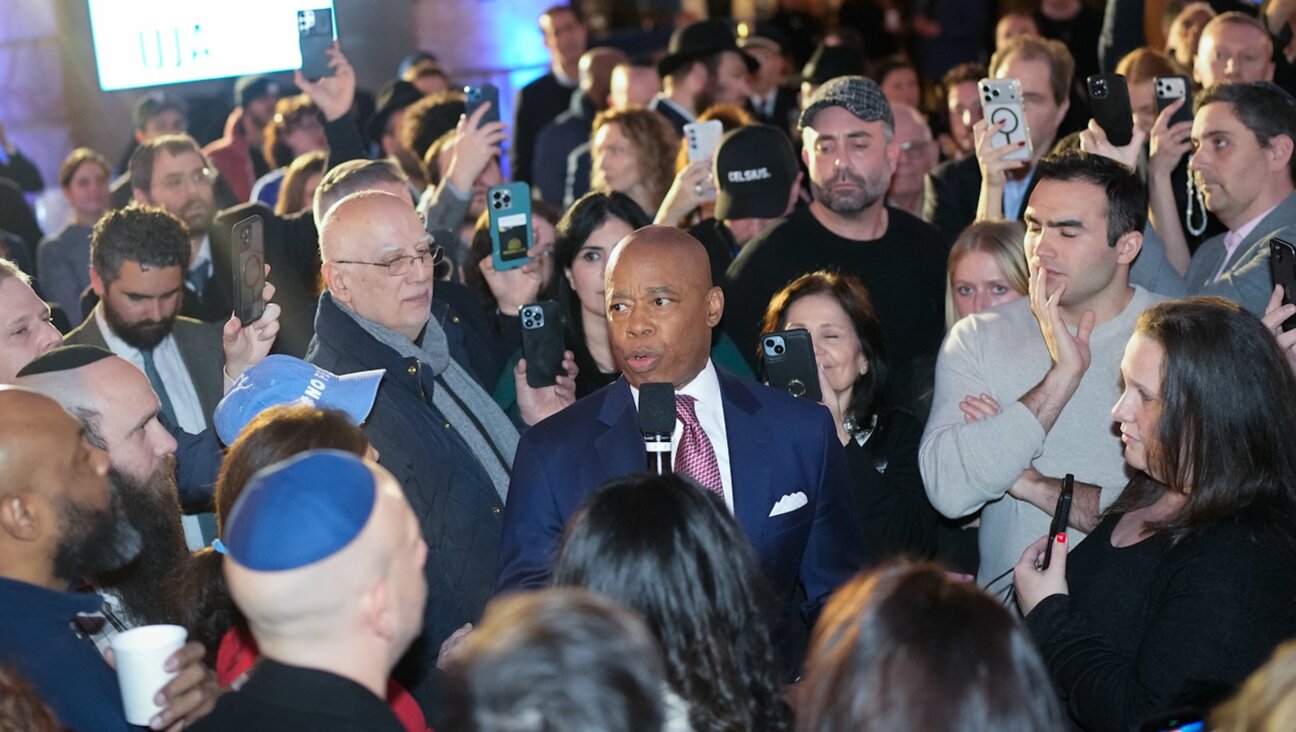GOP Jews Cannot Unite Against Donald Trump — Despite ‘Neutral’ on Israel Declaration

Image by Getty Images
Prominent Jewish Republican leaders and activists show little sign of being able to unify publicly in responding to Donald Trump’s emergence as their party’s presidential front-runner — even after Trump’s failure to condemn dedicated anti-Semites and racists and his declaration that he would be “neutral” on Israel.
With Trump’s triumph in the March 1 Super Tuesday primaries, some in the community are sounding alarm bells, calling for action before it is too late to stop his race to the top. But others in the Jewish Republican camp are cautioning against collectively rejecting Trump.
“If he will be the eventual candidate, you don’t want him to be an enemy,” said Fred Zeidman, a major Jewish Republican donor from Texas who initially backed Jeb Bush and is now waiting on the sidelines. “The last thing I ever want is to have an enemy in the White House.”
Indeed, the risk of making Trump an enemy appeared to be on the minds of some of Trump’s Republican Jewish critics, even as GOP office holders increasingly got off the fence to publicly support or oppose the New York real estate mogul.
One Jewish donor argued that Jewish Republican financial supporters and major activists should speak out in clearer terms against Trump — but he himself was willing to be quoted only on condition of anonymity. “Of course no one wants to run a negative campaign against a Republican candidate,” this source said. “But if we don’t want him as Republican nominee, now is the time to do something.”
Others cited Trump’s insistence that he would remain neutral in his stance toward the Israel-Palestinian conflict so as to ensure his ability to mediate between the two sides.
“Trump promising he’ll be neutral when it comes to Israel is highly concerning,” said a Jewish Republican operative. “Jewish Republicans are obviously troubled by these comments.” This source also insisted on anonymity, because his organization does not endorse candidates.
Still, Trump’s increasing strength spurred others to ramp up their opposition to him, and to do so publicly. Robert Kagan, who is considered among the fathers of American neoconservatism, announced in a February 25 Washington Post article that Trump’s emergence as the most popular Republican candidate has led him to cross the political line: “For this former Republican, and perhaps for others, the only choice will be to vote for Hillary Clinton,” Kagan wrote. “The party cannot be saved, but the country still can be.”
Dan Senor, a Jewish Republican columnist and former George W. Bush administration official, wouldn’t go that far. But he pledged not to vote for Trump if he becomes his party’s nominee. “I’m not voting for Donald Trump. I’m not voting for him in the primary and I’m not for him in the general,” Senor told Bloomberg Politics.
Others have pressed on with an activist campaign to dissuade conservative voters who care about Israel and a strong American internationalist posture from accepting the inevitability of a Trump candidacy. The Emergency Committee for Israel, headed by leading neoconservative William Kristol, released a video ad titled “Trump Loves Dictators,” on February 28. The video showed Trump speaking positively about ousted leaders Saddam Hussein of Iraq and Moammar Gadhafi of Libya, as well as Russia’s Vladimir Putin and Syrian President Bashar al-Assad.
“How can Trump make America great when he’s kissing up to anti-American dictators?” the ad concludes. Kristol, in a press release, said: “If you’re pro-Israel, you shouldn’t be pro-Trump. Apologists for dictators aren’t reliable friends of the Jewish state.”
Meanwhile, the combination of Trump’s electoral success and the increasingly racial tinge to his appeals was moving prominent party figures to take public stands — one way or another — on his candidacy. In the days leading up to the March 1 Super Tuesday primaries, U.S. Sen. Jeff Sessions of Alabama, former Arizona governor Jan Brewer and, most prominently, Trump’s former rival for the GOP nomination, New Jersey Gov. Chris Christie, all endorsed the New York real estate mogul.
At the same time, Trump’s failure to condemn the KKK and Duke spurred House Speaker Paul Ryan to tell reporters on Capitol Hill: “If a person wants to be the nominee of the Republican Party, there can be no evasion and no games. They must reject any group or cause that is built on bigotry. This party does not prey on people’s prejudices.”
Senate Majority Leader Mitch McConnell of Kentucky was even more explicit. “There has been a lot of talk in the last 24 hours about one of our presidential candidates and his seeming ambivalence about David Duke and the KKK,” he said, “so let me make it perfectly clear. That is not the view of Republicans who have been elected to the United States Senate, and I condemn his views in the most forceful way.”
The congressional leaders’ public stands followed a series of increasingly urgent press releases from the Anti-Defamation League, starting on February 25, that called on Trump to “come out firmly against these bigoted views and the people that espouse them.” The statements cited Duke’s remark to listeners of his radio program that “voting against Donald Trump at this point is really treason to your heritage.”
On February 27, CNN anchor Jake Tapper cited the ADL press release and asked Trump whether he would disavow Duke and other white supremacist groups supporting his campaign.
“Just so you understand, I don’t know anything about David Duke, okay?” Trump said. Tapper pressed Trump three times on whether he’d distance himself from the KKK — but Trump never mentioned the group in his answers. “I have to look at the group,” he said, speaking generically about allegedly racist organizations supporting him. “I mean, I don’t know what group you’re talking about. You wouldn’t want me to condemn a group that I know nothing about. I’d have to look. If you would send me a list of the groups, I will do research on them….”
On February 29, ADL obliged, issuing a list of individuals and groups supporting Trump that it found racist, along with thumbnail summaries of their backgrounds. Stressing that it did not endorse or oppose any political candidates, ADL announced that it was distributing the list to all presidential candidates in the Republican and the Democratic party.
Meanwhile, soon after having claimed to not know who Duke was, Trump tweeted a statement citing his brief comment at an earlier press appearance. “As I stated at the press conference on Friday regarding David Duke — I disavow.”
At other recent points in his campaign, as Washington Post columnist Dana Milbank has pointed out, Trump has approvingly quoted Mussolini; sought to discredit a federal judge by invoking the jurist’s Latino ethnicity; taunted protesters by asking, “Are you from Mexico?” and declared that as president he planned to change free-speech laws to make it easier for him to sue news organizations. The cumulative impact of these remarks, and his stance on the Israeli-Palestinian conflict, have spurred an unusual Jewish political coalition of pro-Israel Republicans, neoconservative ideologues and human rights activists to ramp up their criticism of Trump. Some are even calling for a joint Jewish effort to block his nomination. But the lack of Republican Jewish unity on the issue makes that more difficult.
The Republican Jewish Coalition has carefully refrained from speaking out publicly against Trump, although he has little support among the group’s board members. The RJC refused to comment on record on Trump’s recent remarks. Others strongly supported the front-runner.
“Trump will flat out be a friend of Israel,” said Sid Dinerstein, former chair of Florida’s Palm Beach County Republican Party and a longtime Jewish Republican. Dinerstein does not see a problem with Trump’s comments on Israel. “People understand that Trump, every time he opens his mouth, is negotiating,” he said referring to the candidate’s claim that neutrality will help him broker an Israeli- Palestinian deal. “But he’s doing it from a position of strength, and that’s what makes all the difference.”
Zeidman also rejected the alarmist view of Trump, expressing his belief that at the end of the day, Trump won’t be a problem for Jewish Americans who support Israel. “I wish he was more positive on Israel, but I’d be very surprised if as president he wasn’t supportive of Israel,” Zeidman said, adding, “Maybe I’m naive.”
Jay Lefkowitz, a Jewish Republican who served on both Bush administrations, said that a choice between Clinton and Trump in November would be “very depressing.” From the perspective of Israel, Lefkowitz added, “based on Clinton’s record and Trump’s statements, I would have serious concerns about both candidates.”
Contact Nathan Guttman at [email protected] or on Twitter, @nathanguttman

















